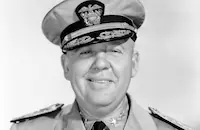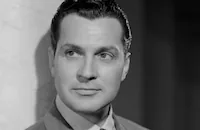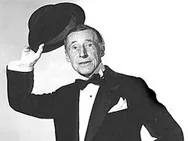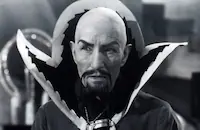White Woman
Cast & Crew
Stuart Walker
Carole Lombard
Charles Laughton
Charles Bickford
Kent Taylor
Percy Kilbride
Film Details
Technical Specs

Synopsis
Judith Denning, a beautiful cafe singer in Malay, has been forced to leave town after town because of gossip that says her husband's suicide was on account of her infidelity. Upright British lawyer C. M. Chisholm accuses Judith of being a "loose white woman" who is tempting the natives and forces her to leave town by getting her fired. Horace H. Prin, "King of the Jungle," then offers to marry her. Prin takes Judith to his jungle home on the river, where he has been running a trading outfit for twenty years. Prin's white management crew consists largely of criminal exiles whose secret pasts he uses as leverage to get them to remain under his ruthless tyranny. When Hambly, who runs a station up the river, insists that the poor diet Prin has been feeding the native workers is breeding insurrection among them, Prin has him killed. Overseer David von Elst, who has not seen a white woman in ten years, quickly falls in love with Judith. A month after Judith's arrival, she and David decide to run away, but when they confront Prin, he refuses to give them a boat and sends David up the river to take Hambly's place at Gubar. David, meanwhile, has told Judith he deserted his regiment after natives decapitated his partner and threw his head through David's window. Since then he has lacked the courage to fight Prin and return to society. Ballister, the new tough overseer, then arrives and immediately asks Judith for a "tumble," undaunted by Prin's eccentric tyranny. When two tribal chiefs request the right to deal with other traders, Prin foolishly refuses them, and they prepare for war against him. The natives kill Connors, one of Prin's men, and throw his head through David's window, after which David finally regains his nerve and travels through the dangerous jungle to warn Judith. David and Judith prepare to leave, but Prin drains their boat of gas. Ballister, sympathetic to the lovers, warns them to take another boat. When Prin shoots his pet baby ape, "Duke," Jakey, Prin's most faithful white servant, throws his machine guns in the river and leaves with David and Judith. Ballister and Prin play poker and drink as the natives approach, armed with spears. After Ballister is killed, Prin declares he is forever king of the jungle and walks out into the onslaught of spears.

Director
Stuart Walker
Cast

Carole Lombard

Charles Laughton

Charles Bickford

Kent Taylor

Percy Kilbride
James Bell

Charles B. Middleton
Claude King
Ethel Griffies
Jimmie Dime
Marc Lawrence
Noble Johnson
Gregg Whitespear
Crew

Film Details
Technical Specs

Articles
Marc Lawrence (1910-2005)
Born Max Goldsmith on February 17, 1910, in the Bronx, Lawrence had his heart set on a career in drama right out of high school. He enrolled at City College of New York to study theatre, and in 1930, he worked under famed stage actress Eva Le Gallienne. Anxious for a career in movies, Lawrence moved to Hollywood in 1932 and found work immediately as a contract player with Warner Bros. (an ideal studio for the actor since they specialized in crime dramas). He was cast as a heavy in his first film, If I Had a Million (1932). Although his first few parts were uncredited, Lawrence's roles grew more prominent: a sinister henchman in the Paul Muni vehicle in Dr. Socrates (1935); a conniving convict aiding Pat O'Brien in San Quentin (1937); a menacing thug stalking Dorothy Lamour in Johnny Apollo (1940); the shrewdly observant chauffeur in Alan Ladd's breakthrough hit This Gun For Hire (1942); and one of his most memorable roles as Ziggy, a fedora wearing mobster in the Bogart-Bacall noir classic Key Largo (1948).
Lawrence, when given the opportunity, could play against type: as the prosecuting attorney challenging Tyrone Power in Brigham Young (1940); a noble aristocrat in the Greer Garson-Walter Pidgeon period opus Blossoms in the Dust; and most impressively, as a deaf mute simpleton in the rustic drama The Shepherd of the Hills (both 1941). Better still was Lawrence's skill at comedy, where his deadpan toughness worked terrifically as a straight man against the likes of Joe E. Brown in Beware Spooks (1939); Abbott and Costello in Hit the Ice (1943); Penny Singleton in Life with Blondie (1945); and Bob Hope in My Favorite Spy (1951).
After that, Lawrence's career took a turn downward spin when he was labeled a communist sympathizer during the Hollywood witch hunts of the early '50s. He was exiled in Europe for a spell (1951-59), and when he came back, the film industry turned a blind eye to him, but television overcompensated for that. Here he played effective villains (what else?) in a series of crime caper programs: Peter Gunn, Johnny Staccato, The Untouchables, Richard Diamond, Private Detective; and eventually made a welcome return to the big screen as a returning exiled gangster in William Asher's underrated mob thriller Johnny Cool (1963).
It wasn't long before Lawrence found himself back in the fray playing in some big box-office hits over the next two decades: Diamonds Are Forever (1971), The Man with the Golden Gun (1974), Marathon Man (1976), Foul Play (1978); and The Big Easy (1987). Sure he was cast as a gangster, but nobody could play a rough and tumble mob boss with more style or conviction.
Interestingly, one of his finest performances in recent years was in television, as a severely ill old man unwilling to accept his fate in a fourth season episode of ER (1997-98). His last screen role was just two years ago, as a nimble minded VP in Looney Tunes: Back in Action (2003).
In 1991, Lawrence published a memoir about his venerable career, Long Time No See: Confessions of a Hollywood Gangster that received much critical acclaim. He has also developed a cult following due to his appearances in such offbeat items as From Dusk to Dawn and Pigs aka Daddy's Deadly Darling, the 1972 horror film he directed and starred in with his daughter Toni. He is survived by his wife, Alicia; two children from a previous marriage, Toni and Michael; and a stepdaughter Marina.
by Michael T. Toole

Marc Lawrence (1910-2005)
Quotes
Trivia
Notes
According to International Photographer, Dewey Wrigley filmed background shots for this film in Baton Rouge, LA. According to a news item in Hollywood Reporter on August 22, 1933, Harry Ruskin was writing the script to this film, although it is unclear whether or not he contributed to the final screenplay. According to files in the Paramount Script Collection at the AMPAS Library, Dorothea Wieck, Walter Abel and Herbert Marshall were considered for starring roles in this film. Early scripts also list E. Lloyd Sheldon as associate producer and Mitchell Leisen as associate director, although their participation in the final film has not been confirmed. According to the autobiography of Elsa Lanchester, Laughton's wife, he had "suffered through" the making of this film with Lombard, whom he did not believe was a "controlled actress." According to a modern source, during shooting, Laughton had French composer Maurice Ravel's 1928 ballet Boléro played between scenes to create the mood of recurrent drums in the jungle. In one scene, Lombard says, "Those drums out there-Ravel must have heard them." This film was remade by Paramount in 1939 as Island of Lost Men.














